第3讲代词
外研版高三英语一轮复习板块一第3讲人称代词、反身代词和物主代词学案
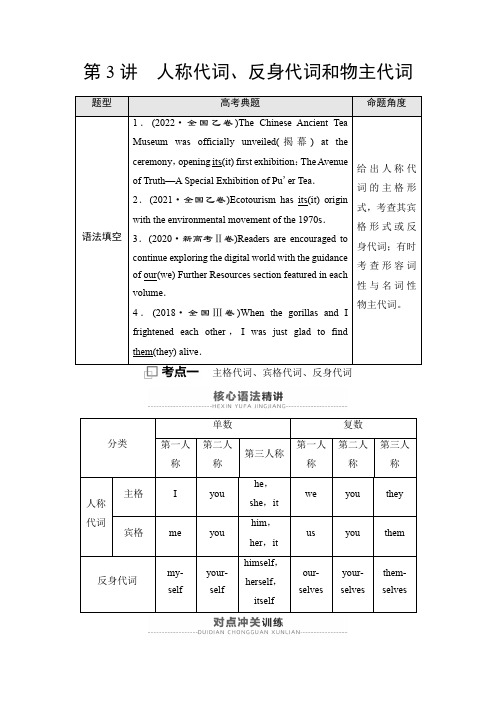
第3讲人称代词、反身代词和物主代词题型高考典题命题角度语法填空1.(2022·全国乙卷)The Chinese Ancient TeaMuseum was officially unveiled(揭幕) at theceremony,opening its(it) first exhibition:The Avenueof Truth—A Special Exhibition of Pu'er Tea.2.(2021·全国乙卷)Ecotourism has its(it) originwith the environmental movement of the 1970s.3.(2020·新高考Ⅱ卷)Readers are encouraged tocontinue exploring the digital world with the guidanceof our(we) Further Resources section featured in eachvolume.4.(2018·全国Ⅲ卷)When the gorillas and Ifrightened each other,I was just glad to findthem(they) alive.给出人称代词的主格形式,考查其宾格形式或反身代词;有时考查形容词性与名词性物主代词。
主格代词、宾格代词、反身代词分类单数复数第一人称第二人称第三人称第一人称第二人称第三人称人称代词主格I youhe,she,itwe you they 宾格me youhim,her,itus you them反身代词my-selfyour-selfhimself,herself,itselfour-selvesyour-selvesthem-selves1.On my desk is a photo that my father took of me (I) when I was a baby.2.That evening I went to hear him (he) speak and was very impressed by his passion.3.Our neighbours gave us a baby bird yesterday that hurt itself (it) when it fell off its nest.4.If our parents do everything for us (we) children,we won't learn to depend on ourselves.5.In the cafe,customers will enjoy themselves(they) in the historical environment which is created for them.6.She was extremely pretty,and her house was a reflection of herself(she),everything in good taste and in perfect order.7.The elderly residents in care homes in London are being given hens to look after to stop them(they) feeling lonely.形容词性与名词性物主代词分类单数复数第一人称第二人称第三人称第一人称第二人称第三人称物主代词形容词性my yourhis,her,itsour your their 名词性mine yourshis,hers,itsours yours theirs1.The President betrayed them when he went back on his (he) promise not to raise taxes.2.The lawyer said,“This child is nobody's child until someone makes her theirs (their) officially.”3.His friends teased him about babysitting his sister and his interests were far differentfrom mine(I).4.But storms move in fast in the mountains,and this one quickly interrupted our(we) peaceful morning trip.5.Part one concludes by introducing my(I) suggested method for adopting this philosophy: the digital declutter.6.Most trains operate just once a day and some run only three times a week,so missing yours(you) can be a disaster.7.Then he and my mother would have a drink while she prepared dinner and they would talk about his day and hers(she).8.Helping the next generation to have a healthy and active childhood is of great importance,and the industry is playing its(it) part.。
第3讲特殊词类

目录|CONTENTS
01
无定代词
02
语气副词
03
敬谦副词
04
结构助词
01
无定代词
代词
代词(pronoun),是指代名词或一句话的一种词类。
汉语:人称代词、疑问代词、指示代词 英语:人称代词、物主代词、指示代词、反身代词、相互代 词、疑问代词、关系代词、连接代词、不定代词和替代词。
或域國国
或
后来借作肯定性无定代词,泛指人或事物。 或劳心,或劳力。(《孟子•许行》) 宋人或得玉。(《左传•襄公十五年》) 或百步而后止,或五十步而后止。(《孟子•梁惠王上》) 夫物之不齐,物之情也。或相倍蓰,或相什伯,或相千万。 (《孟子•许行》)
或
或然率(或然比)也叫概率,几率:是对可能性大小的科 学说明和测定。
之
补语标志。 何兴之暴也?(《史记·项羽本纪》) 未若复吾赋不幸之甚也。(《捕蛇者说》)
之
定语后置标志。
石之铿然有声者,所在皆是也。(《石钟山记》) 蚓无爪牙之利,筋骨之强,上食埃土,下饮黄泉,用心一也。 (《劝学》)
之
用在主谓之间,取消句子的独立性。
昭王之不复,君其问诸水滨。(《左传·僖公四年》) 吾妻之美我者,私我也。(《战国策·邹忌讽齐王纳谏》) 不虞君之涉吾地也,何故?(《左传·齐桓公伐楚》)
02
语气副词
语气副词
语气副词可分为四类: (一)表示肯定和强调语气:诚、信、必等 (二)表示测度语气:其、盖、殆等 (三)表示反问语气:岂、宁、巨等 (四)表示祈使语气:唯、其等
表示肯定和强调语气
子诚齐人也,知管仲、晏子而已矣。(《孟子·公孙丑上》) 臣北方之鄙人也,闻大王将攻宋,信有之乎?(《吕氏春 秋·爱类》) 三人行,必有我师焉。(《论语·述而》)
《精编中考语法专项练习》第3讲:代词
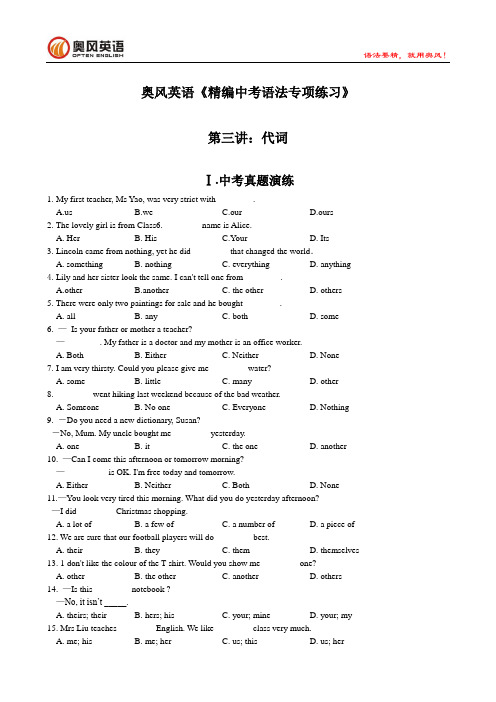
奥风英语《精编中考语法专项练习》第三讲:代词Ⅰ.中考真题演练1. My first teacher, Ms Yao, was very strict with ________.B.weC.ourD.ours2. The lovely girl is from Class6. ________ name is Alice.A. HerB. HisC.YourD. Its3. Lincoln came from nothing, yet he did ________ that changed the world.A. somethingB. nothingC. everythingD. anything4. Lily and her sister look the same. I can't tell one from ________.A.otherB.anotherC. the otherD. others5. There were only two paintings for sale and he bought ________.A. allB. anyC. bothD. some6. —Is your father or mother a teacher?—________. My father is a doctor and my mother is an office worker.A. BothB. EitherC. NeitherD. None7. I am very thirsty. Could you please give me ________ water?A. someB. littleC. manyD. other8. ________ went hiking last weekend because of the bad weather.A. SomeoneB. No oneC. EveryoneD. Nothing9. -Do you need a new dictionary, Susan?-No, Mum. My uncle bought me ________ yesterday.A. oneB. itC. the oneD. another10. —Can I come this afternoon or tomorrow morning?—________ is OK. I'm free today and tomorrow.A. EitherB. NeitherC. BothD. None11.—You look very tired this morning. What did you do yesterday afternoon?—I did ________ Christmas shopping.A. a lot ofB. a few ofC. a number ofD. a piece of12. We are sure that our football players will do ________ best.A. theirB. theyC. themD. themselves13. 1 don't like the colour of the T-shirt. Would you show me ________ one?A. otherB. the otherC. anotherD. others14. —Is this ________ notebook ?—No, it isn’t _____.A. theirs; theirB. hers; hisC. your; mineD. your; my15. Mrs Liu teaches ________ English. We like ________ class very much.A. me; hisB. me; herC. us; thisD. us; her16. It's too hot today. Please give ________ a bottle of orange.A. mineB. heC. herD. our17. An old friend of my sister's always helps my brother and ________ with ________ English.A. I; ourB. me; ourselvesC. I; myD. me; our18. —You’re late again. Do you have anything to say for yourself?—________ except sorry.A. SomethingB. NothingC. Anything19. —The pet cat in your hand is very nice . Is it ________?—Yes, but I’ll give it to my friend Lucy as ________ birthday present.A. you; herB. your; herC. yours; herD. you; hers20. —Excuse me , are these ________ new shoes ?—No, they aren’t. ________ are black over there .A. your, MineB. my; YourC. her; HerD. mine; Yours21. ________ may have a chance to be successful if he tries his best.A. SomebodyB. EverybodyC. NobodyD. None22. —Hi, Jim. Is this your bike or Mary’s?—It’s mine, not ________.A. herB. himC. hisD. hers23. —Is this your key, Jenny ?—No, ________ is in my handbag.A. HisB. HersC. MineD. Yours24. ________ of the two story books are very interesting, so I can’t decide which one to choose.A. AllB. AnyC. EitherD. Both25.—Who helped Jessie with her English ?—________, she taught herself.A. AnybodyB. SomebodyC. NobodyD. Everybody26. Please send ________ best wishes to Mary.A. IB. meC. myD. mine27.—I prefer speaking to listening in English learning .—Oh, really . I think you should be good at ________ of them.A. bothB. neitherC. someD. all28. I have two cats. One is black, and ________ is white.A. anotherB. someC. otherD. the other29. Is there ________ with your bike?A. anything wrongB. wrong anythingC. something wrongD. wrong something30.—I'm hungry. Is there any bread in the fridge?—________ but we have cakes. Would you like to have one?A. SomeB. MuchC. NoneD. Nothing31.—I could look after ________ when I was five .—Really? I can’t believe it.A. myselfB. herselfC. himselfD. yourself32.—How did your uncle learn to play the guitar?—By ________.A. myselfB. yourselfC. herselfD. himself33. I’m expecting a digital camera for long, but dad has no time to buy ________ for me.A. itB. oneC. thisD. that34. Tom has grown ________ enough to take care of ________.A. tall; himB. tall; himselfC. old; himD. old; himself35. There is ________ in today’s newspaper.A something importantB important somethingC anything importantD important anything36. Did you see Peter and Mike? No, I saw ________ of them.A. neitherB. eitherC. bothD. none37.—The teachers in that school speak either English or French, or even ________.—That’s so cool!A. allB. bothC. neitherD. none38. There is ________ in the bag. It's empty.A. nothingB. somethingC. anythingD. somebody39.—Which would you like to drink, coffee or orange juice?—________. Please give me a cup of tea.A. NeitherB. BothC. AllD. None40. He began to teach ________ English last year.A. heB. hisC. himselfD. he’s41. The weather in summer in Beijing is cooler than ________ in Shanghai.A. thisB. itC. thatD. one42. Harry Potter is so interesting a book that lots of teenagers like to read _______________.A. itB. thisC. thatD. oneⅡ. 基础巩固练习一. 选择填空1. computer is less expensive than ,but it works well, too.A. My; hisB. Mine; himC. My; himD. Mine; his2. I’m old enough to wash ________ clothes by myself. You can just wash ________.A. my, yourB. mine, yoursC. my, yoursD. your, my3. Frank can’t find ________ dictionary. Can you lend ________ to ________?A. her; mine; herB. his; yours; himC. my; yours; heD. /; yours; his4. The schools in Shanghai are not different from ________.A. Beijing schoolsB. that of BeijingC. BeijingD. those in Beijing5. The father wished the twins to be doctors, but ________of them liked to study medicine.A. bothB. eitherC. neitherD. none6. An old friend of my sister’s always helps my brother and ________ with ________ English.A. I; ourB. me; ourselvesC. I; myD. me; our7. The two little girls are crying. ________ cannot find ________ mother.A. She; herB. They; themC. They; theirD. They; her8. -Mary doesn’t hear very well.-Yes, there is ________ with her ears.A. anything wrongB. nothing wrongC. something wrongD. wrong something9. Two foreigners are in the sitting room. One is Jack and _______ is Peter.A. otherB. anotherC. oneD. the other10. - Sorry, Mr. Green. Jim can't take part in the relay race because he's ill.-It doesn’t matter. I’ll ask ________ else to go instead of him.A. somebodyB. anybodyC. everybodyD. nobody11. There’s with your watch because it often keeps bad time.A. nothing wrongB. something wrongC. wrong nothingD. wrong something12. -Who is singing in the classroom, Linda?-I think may be Susan.A. sheB. itC. thisD. he13. My teacher is such a kind of person ________ is always ready to help anyone in trouble.A. heB. sheC. whomD. that14. -What a big box! Can I help you, Mr. Wang?-No, thanks. There’s ________ in it. It’s empty.A. nothingB. nobodyC. anythingD. something15. -Who taught you to play basketball?-Nobody,I learnt it by ________.A. myselfB. meC. mineD. my16. -Can I get you a drink?-That’s very nice of you. I’ve already got ________.A. itB. oneC. thatD. this17. -Mary doesn’t he ar very well.-Yes, there is ________ with her ears.A. anything wrongB. nothing wrongC. something wrongD. wrong something18. Miss Brown will teach ________ English next term.A. usB. weC. ourD. ours19. The old woman kept one black dog and two white ________.A. oneB. onesC. thoseD. one’s20. -Is ________ ready for the journey, Wang Bing?-No. we haven’t got a camera.A. everythingB. somethingC. nothingD. anything21. -Who taught you to play the piano, Susan?-Nobody, I learnt it by _______.A. myselfB. meC. mineD. my22. Don’t hurry. We still have _______ time.A. littleB. a littleC. fewD. a few23. -Which would you like, a cup of tea or a glass of water?-______ is OK. I’m thirsty.A. EitherB. NeitherC. BothD. All24. Jack, good boy! Please pass ________ the glasses. I want to read the newspaper.A. youB. meC. himD. her25. -This skirt is much too large for me. Could you show me ________ one?-Certainly. Just a moment, please.A. otherB. anotherC. othersD. the other二. 完成句子:1.This car isn’t mine. It’s _______ (her)2. Can she do it by _______ (she)?3. Yesterday I met a friend of _______ (I) in the street.4. Edison built a science lab _______ (he)5. ---I don’t know which one to choose.---You can take _______of them. They are both very good.6. _______can I do for you?7. _______ do you like better, this one or that one?8. I hope _______ goes well.9.— Do you speak German?—Oh, just a _______.10. _______ the twins enjoyed _______ at the party last Sunday.11. Lucy is in the library, and a classmate of ________ is there, too.12. _______of my two friends passed the exam. I feel very sorry.13. There are many ways to the museum. Can you tell me _______ is the nearest way?14. There are two new students in our class. One is from America, and _______ is from Japan.15. It doesn’t work well, so there is _______ wrong with your computer.16. -Would you like some more bananas?-Just ________.17. The heavy boxes are on the floor and the light _______ are on the shelf(架子).18. I don’t take my dictionary. May I use _______ (you)?19. China ________ is a developing country.20. She said ________, so I didn’t understand what had happened.Ⅲ. 中考模拟强化练习1. -Excuse me, is there a repair shop near here for MP3?-Well, turn left at the crossing, then you will find ________.A. thatB. anyC. thisD. one2. -Whose book is this? Is this yours?-No, it’s _________.A. herB. sheC. myD. hers3. ________of them has an English dictionary.A. EveryB. AllC. BothD. Each4. -Have you ever heard from your aunt since she went to Hong Kong?-Yes, I’ve just got a letter from _________.A.her B. hers C. she D. herself5. Would you please buy some salt for me, Tony? There is _______ left.A. littleB. a littleC. fewD. a few6. They were all very tired, but ________ of them would stop to take a rest.A. bothB. allC. noneD. neither7.I am looking for a house. I’d like _________with a garden.A. oneB. itC. thatD. this8. -Which sweater do you prefer, the yellow or the pink one?- ________. I like a light blue one.A. EitherB. BothC. AnyD. Neither9. –Walt, we have few vegetable for dinner. Could you go and buy _________?-Yes, sure. But I don’t have ________ money.A. any, anyB. some, anyC. any, someD. some, some10.–Are these your books?-No, they’re not ________. My books are over there.A. yoursB. hisC. oursD. mine11. -Do you know the woman in the red dress?-Certainly. She’s Mrs Xu. She teaches ________ chemistry.A. ourB. usC. weD. ours12. Mary’s ruler is much longer than ________.A. ourB. theirC. mineD. her13. -Tom, Mary can’t sharpen the pencil. Can you give ________ a hand?-Certainly.A. sheB. herC. hersD. herself14. -________school is much large than ________.-Really?A. Our, yourB. Our, yoursC. Ours, yoursD. We , you15. Yesterday I saw ________enjoy ________ in the park.A. her, hersB. they, themC. she, herselfD. them, themselves16. -Can I come this evening or tomorrow morning?-________is OK. I’m free today a nd tomorrow.A. EitherB. NeitherC. BothD. None17. It was a long journey, but ________of them four felt boring.A. neitherB. bothC. noneD. all18. The twin brothers always put small presents in ________stocking on Christmas Day.A. each other’sB. each otherC. each othersD. each others’19. -The exam was very easy, wasn’t it?-Yes, but I don’t think _________ could pass it.A. somebodyB. anybodyC. nobodyD. everybody20. Don’t lose _______ in computer games, boys.A. yourselfB. yourselvesC. himselfD. themselves21. We’re got two TV sets, but ________works well.A. anyB. bothC. eitherD. neither22. -Paul, do you know the man standing at the door?- Yes, he is one of ________ friends.A. IB. meC. myD. mine23. -Do you live alone, Mr. Wang?-Yes. I have two children. But ________ of them lives with me. They are now studying in England.A. bothB. noneC. neither24. -Where is my dictionary?-Oh, sorry. I have taken ________ by mistake.A. yoursB. hisC. hersD. mine25. Jack caught a big fish this afternoon. Now he is cooking _______ for dinner.A. itB. oneC. thisD. that答案及解析第三讲:代词Ⅰ.中考真题演练1. A 介词with后用人称代词的宾格形式,故选B。
[原创]2021年《南方新中考》英语 第一部分 第3讲 代词[配套课件](精品课件在线)_16
![[原创]2021年《南方新中考》英语 第一部分 第3讲 代词[配套课件](精品课件在线)_16](https://img.taocdn.com/s3/m/ebe989deeff9aef8951e06b3.png)
it+adj.+to do sth.”表示“认为做某事是……的”,是固定句
式。故选 B。
题2 There is a cup of tea.Please pass ________ to me.(2013
年泸州)
A.one
B.it
C.this
D.that
[点拨]选B Biblioteka 查人称代词 it 的用法。句意:有一杯茶,请
—I agree with you.Group work makes us study better.(2012 年郴州)
A.that
B.it
C.its
[点拨]选B 考查人称代词 it 做形式宾语的用法。to study
with a group 是真正的宾语,所以本句缺少形式宾语 it。“think
优游网 /
生命对于我们只有一次何须烦忧她的最美状态应该是淡然是超脱是开心。” ——老舍《骆驼祥子》 拖延和等待是世界上最容易压垮一个人斗志的东西。, 我要你一辈子想到我的时候心里没有忧愁
疑问代词
题 —________ can we learn from the film Frozen?
—True love, I think.(2014 年佛山)
A.Who
B.What
C.Which
[点拨]选B 考查疑问代词的词义辨析。句意:“从电影《冰
《中考语法完全突破记忆大纲》第3讲代词

第三讲:代词一.代词的分类代词是用来代替名词(或名词性结构)的词。
九类:人称代词,物主代词,反身代词,相互代词,指示代词,不定代词,疑问代词,连接代词和关系代词。
(人物反相指,不疑连关词)二.代词详解1. 人称代词(1) 定义:表示“你,我,他/她/它及其复数”的代词称为人称代词。
(2). 用法①作主语(用主格)如: We eat to live; we don’t live to eat.②作宾语(用宾格)如: They gave him some books.③作表语(主格,宾格皆可)如: It must be he.(主格)It was him that I saw yesterday.(宾格)注意:人称代词作主语,其后不带谓语动词时,在口语中常用宾格。
如: —Does anyone know him?—Me.(3) it的用法①主要用于指代上文提到的事物,也可用于指代婴儿或不明身份的人如:---What’s this?---It’s a book.(=This is a book.)I bought a pen last week, but I lost it yesterday.—Who is it?—It’s Tom.②指代天气, 温度, 时间, 距离, 环境等。
如: It’ s cold today.It’s ten o’clock now.③用作形式主语如: It’s important to master English.(it=to master English)④用作形式宾语如:I found it interesting to teach English.(it=to teach English)2.物主代词(1) 定义:(2) 用法①形容词性的物主代词:只用作定语如: I haven’t got your name.②名词性物主代词: 可用作主,宾,表语。
如: Hers is a new bike.I don’t like hers.Victory will be ours.3.反身代词(1)(2) 用法①作宾语如: God help those who help themselves.(自助者,天助之。
第三讲 代词和介词

特指的不可数名词,相当于“the+单数/不可数名词”。
介词 1.表示时间的 at, in 与 on
(1)at 表示片刻的时间。如:at 8 am, at dawn, at noon, at that
time, at New Year 等。 (2)in 表示一段时间。如:in the morning/afternoon/evening, in October, in 2012, in the 21st century, in summer, in the past 等。 (3)on 指具体的或特定的日子。如:on Monday, on Christmas
例句 Tom taught himself Chinese. She loves me for myself, not for my money.
She is not quite herself today.
I myself can repair the bike.
四、不定代词的用法 1.none, no one 与 nothing 的用法区别 (1)none 既可指人,也可指物,且一定是特指概念,常用来 回答 how many/much 引导的疑问句;no one 只能指人,且只能
7.between 与 among (1)between 一般表示两者之间。 (2)among 用于三者或三者以上的中间。 注意:①有时虽然是三个以上的人或事物,但如果强调两 两相互间的关系,仍用 between。如: Agreements were made between the different countries. 不同国家之间达成了协议。
是泛指概念,常用来回答 who 引导的疑问句;nothing 表示“什
么也没有”,否定一切,常用来回答 what 引导的疑问句。 (2)none 后面可加 of 构成介词短语,而 nothing/no one 却不 能。
高考语文复习讲义:文言文阅读+第3讲+一蹴而就的虚词+.doc

高考专题讲第三讲一蹴而就的虚词北京四中连中国以、之、其、而、焉一、以1. 动词①任用、使用例:忠不必用兮,贤不必以。
②认为例:(众人)皆以美于徐公2. 介词,与其后的名词或名词性短语组成介宾短语作谓语动词的状语①引介动作使用的工具、凭借的条件,相当于“用”、“拿”、“凭”例:以子之矛陷子之盾,何如?②引介动作发生的时间,译为“在”例:武以始元六年春至京师③引介动作发生的原因,译为“由于”、“因为”例:吾以捕蛇独存④引介动作依凭的标准,译为“按照”例:故以言举人,若以毛相马⑤引介所用的名义或资格,译为“用”例:翌日,以资政殿学士行3.连词,一般放在两个动词之间,无宾语例:①有好事者船载以入(拥火以入)②东临碣石,以观沧海③夫夷以近,则游者众④古之君子,其责己也重以周⑤诸侯以公子贤,多客,不敢加兵谋魏十余年。
二、之1. 动词,往例:吾欲之南海,何如?2. 代词①指代第三人称例:余嘉其能行古道,作师说以贻之②指代第一人称“我”例:君将哀而生之乎?③表示近指,相当于“这”、“这种”、“这些”例:均之二策,宁许以负秦曲3.助词①表示修饰或领属关系,译为“的”例:燕雀安知鸿鹄之志②放在主谓之间,取消句子独立性例:孤之有孔明,犹鱼之有水也③宾语、定语前置的标志例:句读之不知,惑之不解蚓无爪牙之利三、其1.代词①第三人称代词,代人代事代物例:其妻献疑曰②个别时指代第一人称,译为“我”例:而予亦悔其随之而不得极夫游之乐也③表远指的指示代词,译为“那”、“那些”例:既其出,则或咎其欲出者④其中的例:于乱石间择其一二扣之2. 副词表示测度、反问、要求、期望等语气,可译为“大概”、“难道”、“一定要”例:①其孰能讥之乎?②尔其无忘乃父之志3.连词用于句首,表示假设、选择关系,译为“是……,还是……”例:其信然也?其梦邪?其传之非真邪?⑴陈述句,委婉的推测语气,相当于“大概”、“恐怕”①微管子,吾其披发左衽矣!②王之好乐甚,则齐国其庶几乎!③其我之谓也。
讲义三·人称代词

一·人称代词·物主代词·反身代词
人称代词·物主代词·反身代词 一览表
(1)人称代词主格:作主语,表示谁怎么样了、干什么了。如:
I am a teacher. You are student. He is a student, too. We / You / They are students.
3.Is that ____ pencil case? a. he b.him c. his d. he’s 4.please give the key to____. a. his b. he c. him d. Mine 2·用括号中的适当you)pencils? Yes, they are _____(our).
(4)名词性物主代词则相当于“形容词性物主代词+名词”,故其后不必加名词。如:
Is this your book?
No,,it isn’t, it’s hers(her book) This pen is mine. 1·练习
1.Is this————— dictionary?
a. you b. yours c. your d. hers 2.It’s a bird(鸟).————name is Happy. a. It’s b. It c. Its d. His
(2)人称代词宾格作宾语,表示动作行为的对象。如:
Give it to me. Let’s go (let’s =let us)
(3)形容词性物主代词( my / your / his / her / its / our / their )+名词。如:
her book my teacher his bike
五年级培优第3讲代词

五年级培优班寒假第3讲代词选出括号中正确的词,在正确的词上打勾1. This is(my / I)mother.2. Nice to meet (your / you).3.(He / His)name is Mark.4. What’s(she / her)name?5. Excuse(me / my / I).6. Are(your / you)Miss Li?7. (I/ My)am Ben.8. (She / Her)is my sister.9. Fine , thank (your / you).10. How old is (he / his)在句子中作主语用_______。
在句子中作宾语用________。
用适当的人称代词填空1. That's Tom's book. Please give ________ to ________.2. They're new students here. Would you please look after ______________?3. His sister is a nurse in the hospital. Do you know________________?4. This is a bedroom, there is a bed in ______.5.______ is a tall and pretty girl.6. I visit my grandma once a year. _______ lives in the countryside. I often miss ________.单项选择( )1. —Where’s your cap? —on the table.A. It’sB. That’sC. They areD. It( )2. —What’s the weather like today? —_____is fine.A. ThisB. ThatC. ItD. Its( )3. are good friends.A. Your sister and IB. I and your sister.C. Your sister and meD. Me and your sister ( )4. One of English.A. we areB. we isC. us areD. us is( )5. Please give the book to ____.A.I B.me C.my D.Mine二、物主代词This is my book. = The book is mine.Is that your soccer ball? = Is the soccer ball yours?These are our new desks. = These new desks are ________.This is her family photo. = The family photo is ________.小口诀:有名则形,无名则名。
高中英语真题:第3讲 数词、代词及主谓一致的5个歌诀与3种方法
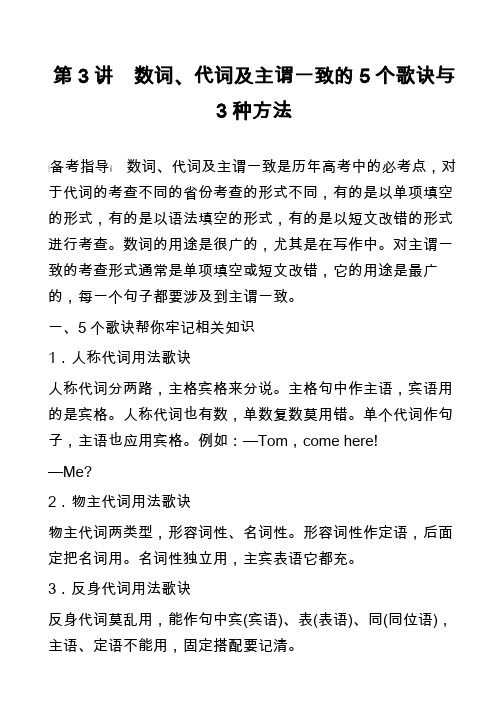
第3讲数词、代词及主谓一致的5个歌诀与3种方法备考指导数词、代词及主谓一致是历年高考中的必考点,对于代词的考查不同的省份考查的形式不同,有的是以单项填空的形式,有的是以语法填空的形式,有的是以短文改错的形式进行考查。
数词的用途是很广的,尤其是在写作中。
对主谓一致的考查形式通常是单项填空或短文改错,它的用途是最广的,每一个句子都要涉及到主谓一致。
一、5个歌诀帮你牢记相关知识1.人称代词用法歌诀人称代词分两路,主格宾格来分说。
主格句中作主语,宾语用的是宾格。
人称代词也有数,单数复数莫用错。
单个代词作句子,主语也应用宾格。
例如:—Tom,come here!—Me?2.物主代词用法歌诀物主代词两类型,形容词性、名词性。
形容词性作定语,后面定把名词用。
名词性独立用,主宾表语它都充。
3.反身代词用法歌诀反身代词莫乱用,能作句中宾(宾语)、表(表语)、同(同位语),主语、定语不能用,固定搭配要记清。
4.基数词变序数词歌诀一、二、三,特别例,结尾字母t,d,d。
th,四加起,八去t,九去e,y要用ie替。
ve必须变f,five,twelve是俩兄弟。
若是遇到几十几,只变个位就可以。
5.英语分数巧记歌诀英语分数不费事,“母序子基”四个字,分子若是大于一,分母还需加s。
二、3种解题方法方法1 明确指代法在解答代词题目时,我们应首先分析前后文,明确代词所指代的对象,从而避免误判。
具体说来应从以下几方面考虑:(1)代词指代的是人还是物;(2)代词指代的是可数名词还是不可数名词;(3)代词指代的是特指还是泛指概念;(4)代词指代的概念是表示两者之间还是三者或三者以上;(5)代词所表示的是肯定还是否定概念。
典例展示1 (2016·全国卷Ⅱ)It does not cost many, yet we can still learn a lot.________答案many→much解析本句中代词much代替不可数名词much money作动词cost的宾语,而many通常代替可数名词的复数形式。
中考英语复习讲义第3章各种代词的用法

中考英语复习讲义第3章各种代词的用法代词是代替名词的词。
按其意义、特征及其在句中的作用可分为:人称代词、物主代词、指示代词、反身代词、相互代词、疑问代词、不定代词等。
其中,反身代词、物主代词、不定代词和疑问代词是中考的高频考点。
比如名词性物主代词与形容词性物主代词的区别,疑问代词含义区分,不定代词的正确选用,都是考查的重点。
对于不同类型代词的相关知识的学习,既要全面又要有重点。
内容导视知识点1 人称代词知识点2 物主代词知识点3 反身代词知识点4 指示代词知识点5 不定代词知识点6 相互代词知识点7 疑问代词知识详单知识点1 人称代词人称代词起代表人和事物的作用,有人称、数和格的变化。
1.人称代词的形式人称格第一人称第二人称第三人称单数复数单复数单数复数主格I我We我们You你he,他she, 她it它they他们宾格Me我Us我们You你Him他, her她, it它them他们成分说明例句作主语人称代词主格在句中作主语,通常放在句子的句首,代替上文提到的人、物或事。
Tom is my classmate. He likes watching TV. (He主格作主语替代Tom)作宾语人称代词宾格在句中作谓语动词或介词宾语。
My mother loves me. (me宾格作动词love 的宾语)Give them some books. (them宾格作动词give的宾语)作表语【知识拓展】1.人称代词在than之后与其他人或事物进行比较时,用主格和宾格都可以。
例如:He is taller that I/me.他比我高。
2.人称代词在句中并列使用时,单数单数情况的顺序为:“二,三,一人称”,即you, he and I;复数情况的顺序为“一,二,三人称”,即we,you and they。
如果要承担责任,说话者则把第一人称((I或we)放在最前面。
例如: You, she and I can answer the question. 你,她和我能回答这个问题-Who broke the window?谁打破了窗户?-I and Tom.我和汤姆。
英语语法精讲人称代词和物主代词区分

英语语法精讲人称代词和物主代词区分人称代词和物主代词是英语语法中常见的代词类型,它们在句子中承担着不同的语法角色。
在本文中,我将为你详细介绍人称代词和物主代词的区别以及它们在句子中的应用。
一、人称代词的基本概念人称代词主要用来代替特定的人或物,从而避免重复使用名词。
根据在句子中所处的不同角色,人称代词分为三种不同的人称:第一人称、第二人称和第三人称。
下面是它们的具体用法和示例:1. 第一人称代词(Singular: I,Plural: we)第一人称代词用来代表说话者自己或与说话者有关的人或物。
示例:- I am a student.- We like to travel.2. 第二人称代词(Singular: you,Plural: you)第二人称代词用来代表与说话者进行交流的人或物。
示例:- You are my best friend.- You should take care of yourself.3. 第三人称代词(Singular: he/she/it,Plural: they)第三人称代词用来代表除说话者和听话者之外的人或物。
示例:- He is a doctor.- They are studying at the university.二、物主代词的基本概念物主代词用来表示所属关系或拥有关系,常常与名词连用。
它们可以代替名词,表达出所属关系。
下面是物主代词的具体用法和示例:1. 第一人称单数物主代词(my)第一人称单数物主代词用来表示说话者的所属关系。
示例:- This is my book.- My parents are coming tomorrow.2. 第二人称物主代词(your)第二人称物主代词用来表示与说话者交流的对象的所属关系。
示例:- Is this your car?- Your dog is very cute.3. 第三人称物主代词(Singular: his/her/its,Plural: their)第三人称物主代词用来表示与说话者和听话者之外的人或物的所属关系。
2015届中考语法名师讲练【第3讲】代词ppt课件(52页)

(2)人称代词在 than 之后与其他人或事物进行比较时,用主 格或宾格都可以。如: He is three years older than me/I.他比我大三岁。
-self/-selves 构成。
(3)反身代词用作宾语时,常用于下列搭配:
teach oneself (sth.)=learn (sth.) by oneself 自学
help oneself to...随便吃/拿„„
enjoy oneself 玩得愉快 dress oneself 自己穿衣
look after oneself 照顾自己
I can look after myself.我可以照顾好我自己。
The box itself is not so heavy.箱子本身并不重。
反身代词表本身,句中可作两成分;
表示强调同位语,宾语动作回自身。
(2)反身代词的构成 第一、二人称的反身代词是用形容词性物主代词加
-self/-selves 构 成 , 第 三 人 称 的 反 身 代 词 是 用 宾 格 代 词 加
all by oneself 独自地 leave sb.by oneself 把某人独自留下
指示代词 初中阶段常见的指示代词有: 单数:this, that, it, such, so
复数:these, those 1.指示代词起指示作用,既可指物也可指人,在句中可作 主语、宾语,或相当于形容词来充当定语。如:
物主代词分两家,形、名词性各一霸;
his 和 its 无变化,my 与 mine 牢记它;
词汇与语法 第3讲(词汇--名词-代词-主谓一致)

2).两个由and连接的并列名词性分句作主语, 如果主语表示两件事情,动词用复数。例如:
What caused the accident and who was responsible for it remain a mystery to us.
2. ____ is a great pity that there are some disagreements in the school board meeting.
A. That B. This C.√It D. There
.
7
名词&代词
3. We like our English teacher because she often tells ______ funny stories in class.
Most of the money _w_a_s__ recovered by Deputy Player.
Most of the members _w__e_re__ there.
All of the cargo __w_a_s__ lost.
All of the crew _w_e_r_e__ saved.
A.√us B. our C. we D. ours
4. There are 40 teachers in this school , ten of whom are _____.
A.man teachers B. men teacher
B.C. man teacher D. men√teachers
但people, police等只能用复数.
初中英语语法大全 之 代词部分
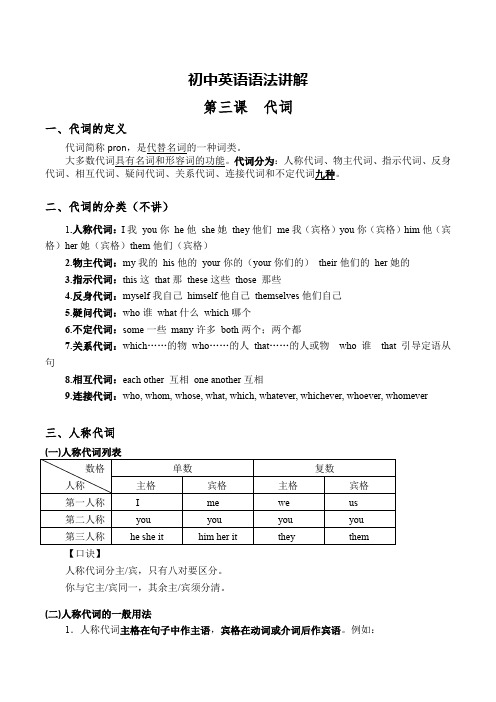
初中英语语法讲解第三课代词一、代词的定义代词简称pron,是代替名词的一种词类。
大多数代词具有名词和形容词的功能。
代词分为:人称代词、物主代词、指示代词、反身代词、相互代词、疑问代词、关系代词、连接代词和不定代词九种。
二、代词的分类(不讲)1.人称代词:I我you你he他she她they他们me我(宾格)you你(宾格)him他(宾格)her她(宾格)them他们(宾格)2.物主代词:my我的his他的your你的(your你们的)their他们的her她的3.指示代词:this这that那these这些those 那些4.反身代词:myself我自己himself他自己themselves他们自己5.疑问代词:who谁what什么which哪个6.不定代词:some一些many许多both两个;两个都7.关系代词:which……的物who……的人that……的人或物who谁that引导定语从句8.相互代词:each other 互相one another互相9.连接代词:who, whom, whose, what, which, whatever, whichever, whoever, whomever三、人称代词【口诀】人称代词分主/宾,只有八对要区分。
你与它主/宾同一,其余主/宾须分清。
(二)人称代词的一般用法1.人称代词主格在句子中作主语,宾格在动词或介词后作宾语。
例如:I like table tennis.(I作主语)Do you know him?(him作宾语)2.(不讲)人称代词还可以作表语。
作表语时用宾格。
例如:—Who is knocking at the door?—It's me.注意:I(我)无论放在句首、句尾还是句中,都要大写。
(三)人称代词的特殊用法【口诀】人称代词主宾格,作用不同莫用错。
主格动前做主语,动词介词后宾格。
单数人称二三一,复数人称一二三(顺序)。
第3讲 七年级上 Unit3-4【名师导航】2024中考英语教材梳理学案(原卷版)
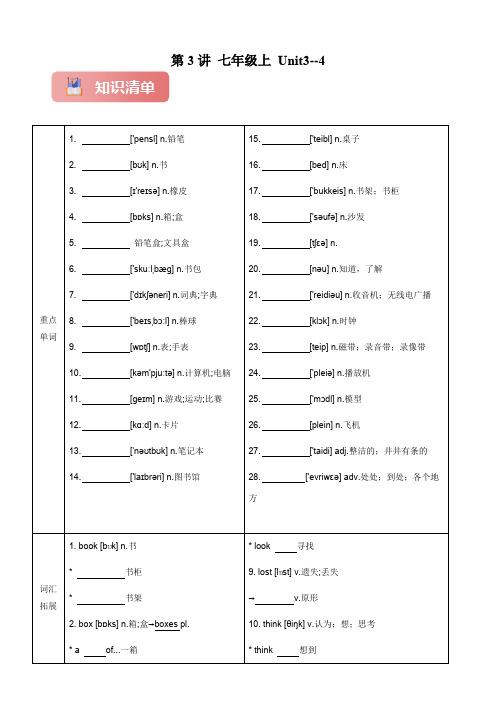
第3讲七年级上Unit3--4重点单词1.['pensl] n.铅笔2.[bʊk] n.书3.[ɪ'reɪsə] n.橡皮4.[bɒks] n.箱;盒5.铅笔盒;文具盒6.['skuːlˌbæg] n.书包7.['dɪkʃəneri] n.词典;字典8.['beɪsˌbɔːl] n.棒球9.[wɒtʃ] n.表;手表10.[kəm'pjuːtə] n.计算机;电脑11.[geɪm] n.游戏;运动;比赛12.[kɑːd] n.卡片13.[ˈnəʊtbʊk] n.笔记本14.['laɪbrəri] n.图书馆15.['teibl] n.桌子16.[bed] n.床17.['bukkeis] n.书架;书柜18.['səufə] n.沙发19.[tʃɛə] n.20.[nəu] n.知道,了解21.['reidiəu] n.收音机;无线电广播22.[klɔk] n.时钟23.[teip] n.磁带;录音带;录像带24.['pleiə] n.播放机25.['mɔdl] n.模型26.[plein] n.飞机27.['taidi] adj.整洁的;井井有条的28.['evriwɛə] adv.处处;到处;各个地方词汇拓展1.book [bʊk] n.书* 书柜* 书架2.box [bɒks] n.箱;盒→boxes pl.* a of...一箱* look 寻找9.lost [lɒst] v.遗失;丢失→v.原形10.think [θiŋk] v.认为;想;思考* think 想到知识清单12.e-mail me at... 用……给我发电子邮件13.school ID card 我的学生卡26.o n your head 在你头上重点句型1.—Is this/that your pencil?—Yes, is. It’s mine. /No, isn’t. It’shis.2.—Excuse me,is this your pencil?—Yes,thank you.3.—Are these your books?—Yes, are. They are mine.4.—Are those your keys?—No,they . They’re Bob.5.Thank you for your help.6.—The blue pen is his.—What this dictionary?7.I lost my school ID card. I must it.8.—Where’s the schoolbag?—I t ’s under the table.9.— Where are my books?—They’re on the sofa.10.W here is your ruler?11.—Where’s my bag?—Is it on your desk?12.I t’s not under the chair.13.I think it ’s in your grandparents’ room.14.I‘m tidy,but Gina is .15.I have a clock.16.G ina’s books are .知识点考点透析◆考点1 Thank you for…“Thank you for”指因某种原因而感谢对方,相当于“Thanks for…”。
牛津译林七年级下Unit3代词名词所有格精讲和相关所有代词

初中英语备课模板课题代词语语法上,这些代词叫做反身代词。
表示“我自己”“你自己”“他自己”的自己,用self来表示,复又分给小明一个,也是another这部分蛋糕分完了,还有剩余,所以another指的是没有分完,不是最后的一块。
而最后一块叫做The other特指最后一个。
朋友多了,我又买了个蛋糕。
分了一些给小花,因为她要带回去和家人一起吃,所以给了她some然后又分了一些给小黄,小绿,叫others,最后还剩余好几块呢,都是我的,叫做the others 分析卜列句子:Show me some others再拿一些给我看。
Where are the other students?其他同学在哪里?注:another后一般要单数可数名词,但右其后的名词有数词或few 修饰,则也可接复数名词。
如:I've got another five minutes.我还有5 分钟。
疑问代词:小明:疑问词是什么词呢?王老师:呃,疑问词的作用主要是用于引出特殊疑问句。
小明:特殊疑问句之前讲过,我已经知道什么是特殊疑问句了。
王老师:他们不见得都会啊,利用这个机会,你给大家补习一下特殊疑问句是什么吧!小明:呃,我给自己挖个大坑啊……小明:能够用简单的yyes或者no回答的句子就是一般疑问句,不能用简单的yes或者no回答的是特殊疑冋句。
比如下面这些句子:(过年回家,亲戚们都围了上来:)大姨:小明在学校里谈对象了吗?二姨:对象是哪里人呀?三姨:准备啥时候结婚呀?四姨:准备在哪里结婚啊?大姑:你们买房了吗?二姑:你们有车吗?三姑:你们准备什么时候要孩子啊?四姑:打算要二胎吗?小明:调查户口小分队又进村儿扫荡了!小明:以上这些句子中:大姨,大姑,二姑,四姑的话能用简单的yes 或者no来回答,所以是一般疑冋句,而剩余的不能简单的用yes或者no来回答,而是要这样回答:回二姨:我对象是洛阳人。
回三姨:我们准备年底结婚。
初中英语代词精讲

疑问代词
疑问代词有who,whom,whose,what和 which等。在句子中用来构成特殊疑问句。 ※疑问代词也可用作连接代词,引导名词 性从句(主语从句、宾语从句和表语从句) 如:Tell me who he is. 告诉我他是谁。
关系代词
关系代词有who,whom,whose,that, which,as等,可用作引导从句的关联词。 它们在定语从句中可作主语、表语、宾语、 定语等;另一方面它们又代表主句中为定 语从句所修饰的那个名词或代词(通称为 先行词)。 如: He is the man whom you have been looking for. 他就是你要找的那个人。
主格 we you they they they
物主代词
物主代词表示所有关系的代词,也可叫做代词所有格。物 主代词分形容性物主代词和名词性物主代词二种,其人称 和数的变化见下表。 数 人称 单数 复数 第一 第二 第三 第一 第二 第三 人称 人称 人称 人称 人称 人称 形容词性 my your his/her its our your/their 物主代词 名词性 mine yours his/hers its ours y表示"那个"、"这个"、"这些"、"那 些"等指示概念的代词。指示代词有this, that,these,those等。 如: That is a good idea. 那是个 好主意。
反身代词
表示"我自己"、"你自己"、"他自己"、"我们 自己"、"你们自己"和"他们自己"等的代词, 叫做自身代词,也称为"反身代词"。 如: She was talking to herself. 她自 言自语。
- 1、下载文档前请自行甄别文档内容的完整性,平台不提供额外的编辑、内容补充、找答案等附加服务。
- 2、"仅部分预览"的文档,不可在线预览部分如存在完整性等问题,可反馈申请退款(可完整预览的文档不适用该条件!)。
- 3、如文档侵犯您的权益,请联系客服反馈,我们会尽快为您处理(人工客服工作时间:9:00-18:30)。
第3讲代词()1.—________ is your father?—A bank clerk.He works in a bank near my home.(滨州)A.Where B.How C.What D.Which()2.—Wow! How beautiful! ________ flowers are these?—Today is Mother's Day.They are for ________,Mum.(泰州)A.Which; you B.Which; yours C.Whose; yours D.Whose; you()3.As for learning English, students who read a lot can do much better than ________ who don't.(包头)A.those B.that C.these D.them()4.________ went hiking last weekend because of the bad weather.(滨州)A.Someone B.No one C.Everyone D.Nothing()5.It is a good habit of ________ to read a few lines before going to bed.(河北)A.I B.me C.my D.mine()6.You don't have a drink.Can I get you ________?(河北)A.something B.anything C.nothing D.everything()7.—Tom, supper is ready.—I don't want to eat________,Mum.I'm not feeling well.(北京)A.everything B.nothing C.something D.anything ()8.—________ is that man over there?—He's my uncle.(南充)A.What B.Who C.Whose()9.—Is this ________ ruler?—No.________ is over there.(黔西南)A.her; Her B.her; Hers C.hers; Hers D.hers; Her()10.—________ are you going to buy for your father for Father's Day?—A T-shirt.(德州)A.What B.When C.Where D.How()11.I can't find my ticket.I think I must have lost ________.(杭州)A.it B.one C.this D.them()12.—The cars made in Germany are more expensive than ________ made in Japan.—Yes, you are right.But they're much better.(呼和浩特)A.those B.that C.ones D.it()13.—Which jacket do you prefer, this one or that one?—________ is OK.I don't care too much.(威海)A.Both B.Either C.Neither D.All()14.At present, children mean ________ to most parents in China.(河南)A.everything B.nothing C.anything D.something ()15.—Which of the two magazines will you take?—I'll take ________ though I find ________ of them are very useful to me.(黄冈)A.all; both B.either; either C.either; neither D.either; both()16.In our school, ________ students like English, but ________ of them can speak English smoothly.(铜仁)A.a little; a few B.a few; few C.a few; little D.a little; few()17.—Is ________ here?—No.Kate is ill in hospital.(厦门)A.someone B.anyone C.everyone()18.When we got to the park yesterday, ________ started raining.(菏泽)A.that B.it C.this()19.—Who taught Zhu Zhiwen to sing?—________!He learned singing by himself.(菏泽)A.Everybody B.Somebody C.Nobody()20.—What would you like to drink?—I'm very thirsty.________ you can get.Just get it now.(南京)A.Anything B.Something C.Nothing D.Other things()21.Unfortunately, I was sitting at the table with smokers on ________ side of me.(杭州)A.either B.both C.other D.all()22.—Which would you like, a cup of tea, a cup of coffee or a glass of milk?—________.I think I'll just have a glass of water.(阜康、米泉)A.Both B.Neither C.None D.Either()23.—Would you like some more noodles, Celia?—Yes, just ________,please.(资阳)A.a few B.few C.a little D.little()24.The exchange student from Australia is a friend of ________.She enjoyed ________ at the Art Festival held in Beijing yesterday.(随州)A.me; herself B.mine; hers C.mine; herself D.me; hers()25.Our teacher was very happy because ________ failed the examination.(江西)A.somebody B.nobody C.anybody D.everybody()26.Mr.Wu teaches ________ English.We all like ________.(泰州)A.our; him B.us; him C.us; her D.our; her()27.There is ________ wrong with my back and it hurts seriously.(长沙)A.anything B.something C.nothing()28.Your hometown is really nice! The air quality is as good as ________ of Sanya.(常州)A.it B.one C.that D.the one()29.—The East Lake is not far from the Yellow Crane Tower, so you can easily visit ________ in a day.—Fantastic! I can't wait for it.(武汉)A.none B.both C.all D.either()30.—Do you know ________ this iPhone 5 belongs to?—Let me see.Oh, it's ________.(鄂州)A.whose; her B.whose; hers C.who; her D.who; hers()31.—I'd like some more apple juice.—Sorry, there's ________ left.(宿迁)A.nothing B.none C.few D.a few()32.Bob hurt ________ in the basketball match at school yesterday afternoon.(贵阳) A.myself B.himself C.herself()33.—Welcome to Dream Music Club.Can you play the violin or the piano?—________.But I can play the guitar.(厦门)A.Either B.Both C.Neither()34.The room is empty.I can't find ________ in it.(绥化)A.somebody B.nobody C.anybody()35.—Are these your cards?—No, ________ are over there.I like ________ very much.(营口)A.my; them B.mine; they C.mine; them D.my; they()36.—Can you speak Chinese, Steve?—Yes, only ________.I have been in China for only one month.(云南)A.few B.a few C.little D.a little()37.I found ________ not very easy ________ to ride a bike.(齐齐哈尔)A.that; learn B.it; to learn C.that; to learn()38.I bought a smart phone (智能手机) yesterday, and it works well, would you like to buy ________ like this? (丹东)A.it B.this C.one D.that()39.The answer is wrong.There are ________ mistakes.(张家界)A.some B.no C.much()40.—Have you watched the TV report about MERS?—Yes, it's ________ new dangerous disease (疾病).(宜昌)A.the other B.another C.others D.other()41.—Is there ________ in today's newspaper?—Yes, quite a lot.(淮安)A.anything interesting B.something interestingC.interesting anything D.interesting something()42.Jane looked carefully at ________ in the mirror before going outside.(沈阳)A.her B.him C.herself D.himself()43.—What's your QQ number?—________ is 355994127.(南宁)A.I B.He C.It D.She()44.—________ will you ask for help when you get into trouble?—My parents, I think.(海南)A.Who B.What C.Where()45.—________ father took part in the charity activity in the neighbourhood yesterday?—Peter's.(上海)A.Whose B.What C.Which D.Who()46.—Do you know Lily and Lucy?—Yes, but the twins look so similar that I always mistake the one for ________.(营口)A.the other B.the others C.another D.other()47.Excuse me, may ________ use your dictionary? ________ is lost.(茂名)A.I; Mine B.I; My C.my; Mine()48.—________ T-shirt is this?—I think it's Tom's.(北京)A.Whose B.Which C.What D.Who()49.—________ do you like better, Where Are We Going, Dad or Running Man?—I prefer Running Man because it is really interesting.(原创)A.What B.Whom C.Which D.Who()50.—________ is the naughty boy playing with?—With Wang Bing.(原创)A.Whose B.Whom C.What D.Which第3讲1—5CDABB 6—10ADBBA 11—15AABAD 16—20BCBCA21—25ACACB26—30BBCBD 31—35ABCCC 36—40DBCAB 41—45ACCAA 46—50AAACB。
